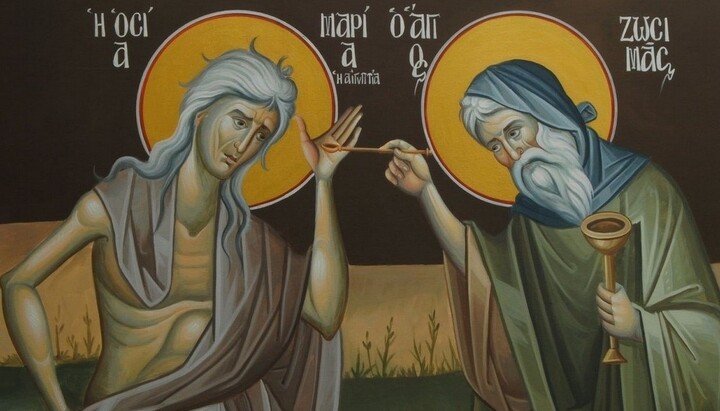There is no need to chase or flee from your shadow

Sunday Homily
The life of St. Mary of Egypt, which we commemorate this week, is a vivid testimony to how God’s grace can work in a human being. Her story teaches us that there is no depth of sin from which the Lord cannot rescue a soul – provided the person gives their consent.
Deep within us lies a secret place untouched by sin. This is the foundation of God’s providential design. It is unchanging. True personhood has no age, gender, ethnicity, or genetic traits. These are merely peripheral, temporary, earthly attributes. Yet because the soul is capable of change, it also has the ability to be healed from its sinful ailments while it still dwells in the body: “Though our outer man is perishing, the inner man is being renewed day by day” (2 Corinthians 4:16). The purpose of life is that this inner renewal never ceases – not for a moment.
The environment we live in, the temptations we face, and the individual fate of each person and nation are the instruments through which God carries out our salvation.
But the egotist within us craves stability, comfort, and uninterrupted wellbeing. He fears change that could disrupt that comfort. The same goes for a rigid religiosity that clings to ritual and material prosperity. It seeks steady income and the power that guarantees it.
Salvation becomes possible when the soul, renewed by grace and rejecting egotism, enters into its spirit – where Christ waits with open arms. The Savior does not wait for us in heaven, but in the spiritual heart within, reaching out to us from there.
Everything happening in this world is like a dream. In this dream, we see ourselves as citizens of a country, as male or female; we hold some position, we struggle, we pursue goals.
But death comes – and the dream ends. A person awakens and shakes off the nightmare.
Is there anything in this life that is truly real? Yes – there is. And it is hidden deep within us. There dwells our spirit: an impartial observer of everything that happens to us. It feels no pain, has no thoughts or emotions. It watches us as if from afar.
Meanwhile, the soul – caught up in this earthly dream – plays the role assigned to it. It rejoices, weeps, desires, suffers, immersing itself in the fleeting moments that form our earthly biography. But all these feelings and experiences are nothing more than traps of the mind. Joys and sorrows, happiness and grief – these are unstable, passing states.
To chase after the good and flee from the bad is like trying to catch your shadow or run away from it. Everything we experience exists only within ourselves. The peace our soul so longs for – and tries to find outside – exists only within.
What causes the soul to suffer? Inconstancy, fear of the future, anxiety about the present, and the nightmare that earthly life so often becomes. Yet all of these are linked to where we direct our attention.
Today, we are all burdened by the horrors of war in our suffering homeland. But let a sudden, unbearable toothache arise, and we may forget the war entirely in that moment. The war continues, but all our attention is consumed by personal pain.
If not for that pain, could we turn our focus elsewhere? Of course. It depends on our will and the meaning we assign to our life.
The heaviest burden to move from one place to another is attention. But if we can redirect it from the external to the internal, everything begins to change. The world and the devil begin to loosen their grip, forced to release a soul that no longer clings to them. Their only power lies in our attention to what happens in the world and to our bodies.
Freedom in Christ becomes true paradise – even here on earth – if we stop giving so much attention to the external and focus instead on our inner life. Then we will press the Holy Gospel to our hearts and say to Christ, as the apostle once did: “Lord, to whom shall we go? You have the words of eternal life” (John 6:68).
If our outward Christianity does not lead us inward, we will remain in a kind of Orthodox reserve.
A reserve richly adorned with painted and stone decorations, with beautiful church singing, a well-developed liturgical system, ancient traditions, venerable elders, and hierarchs indulging in the trappings of medieval etiquette. We may grow in knowledge and thought, but never gain that blessed poverty of spirit that grants us the Kingdom of Heaven.
When the mind is absorbed in the elements of this world, it merges with it and sees physical death not as a door to our true homeland, but as a terrible tragedy. Such a person dissolves into daily concerns: bread, children, grandchildren, work, household needs – and suffers deeply over it all. Like a wound-up clock, their thoughts circle endlessly around their little earthly nest – until the spring runs out and the hands stop moving.
But the world and all its works will pass away. To pour all one’s soul into it is a thankless task.
When the soul realizes that we are returning to the dust from which we were made and must leave all things behind, it begins to reflect on what is truly real. These reflections become a distress signal sent up to God.
And this signal sounds like this: “Lord Jesus Christ, have mercy on me.”
It becomes the ever-burning beacon of one who cries out for help day and night.
The world is a clown, a liar, a magician who steals the time of life, leading us by the nose. Whatever it seems to give us, it can snatch away in an instant, and we are left with nothing. The only thing it cannot take is grace – because it cannot give it. Everything else is bait, meant to provoke tears.
The most unstable place in all creation is our mind. It changes from moment to moment. But when the mind is calmed and stilled, a person begins to feel the spiritual heart – gentle and humble – living in the depths of the self. In that heart, all anxieties and worries fade, thoughts sink and disappear. There, in its great stillness, lives the light of divine love.
Attention of the mind directed toward prayerful stillness, courage, and resolve – these are the foundation of spiritual life.
The main enemy of our salvation is self-centeredness, or egoism. It is a parasitic growth that prevents us from living in the fullness of divine grace. It cuts off even the smallest effort to expel it from the soul.
The mind is wrapped in fogs of thoughts and fantasies. The heart is enshrouded in passions and the pursuit of pleasure.
Above all, egoism fears humble, repentant prayer and absolute trust in God.
God cannot be known through thoughts. Knowledge is not the tool by which we come to know Him. “God is spirit, and those who worship Him must worship in spirit and in truth” (John 4:24). He is known by the heart, for “blessed are the pure in heart, for they shall see God” (Matthew 5:8).
When thoughts disappear from the heart, God’s grace begins to dwell there. And when grace takes root, the heart becomes an earthly paradise – one with the Kingdom of Heaven.
Where then are the earth and its sorrows? Where are the skies with their sunsets and dawns?
Everywhere, and always, shines the One Eternal God – Jesus Christ. To Him be glory forever.









